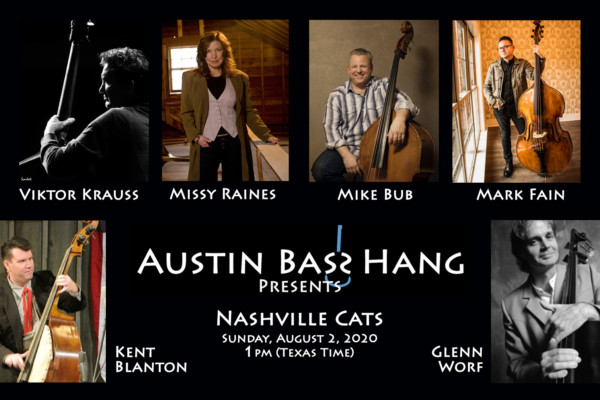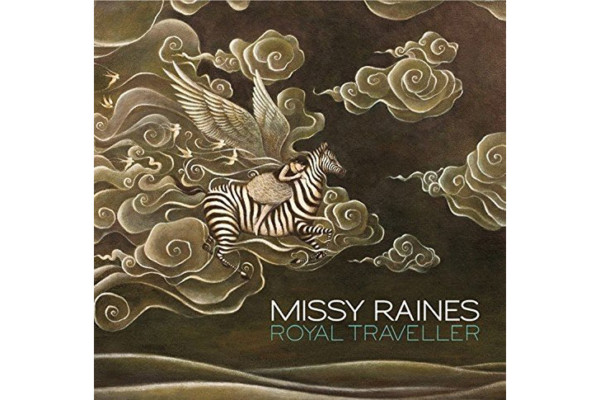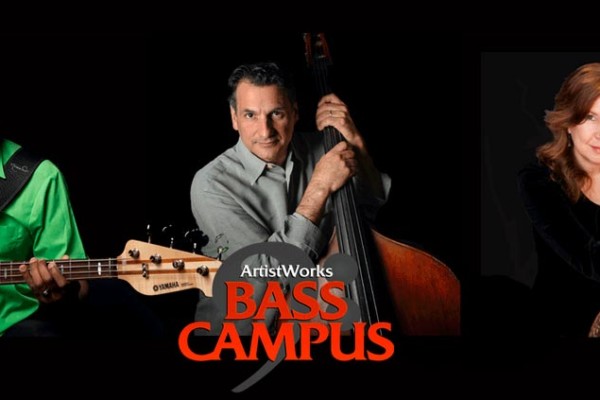New Grass: An Interview With Missy Raines
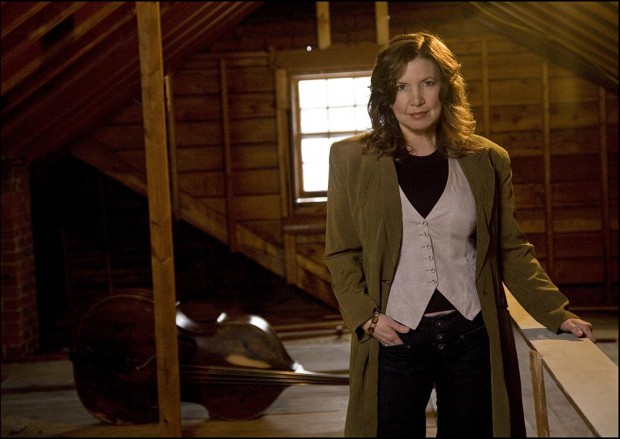
You wouldn’t typically think of bluegrass bass as pushing the limits, but Missy Raines isn’t your typical bluegrass bassist. A seven time winner of the International Bluegrass Music Association’s Bass Player of the Year Award, her penchant for musical experimentation took her from a traditional bluegrass background to a more progressive style that draws from jazz, pop, and a little rock. It can be best heard in her band The New Hip, which consists of bass, guitars, mandolin and drums.
She currently stands with John Pattitucci and Nathan East as a faculty member of the new ArtistWorks Bass Campus as well as their Academy of Bluegrass. The online school offers video-based learning with students being able to send private videos to their teacher and receive personal videos as a response.
We reached out to Missy to get the scoop on her start, her style, and her role in the new Bass Campus.
How did you start playing bass?
My parents were music enthusiasts, particularly for bluegrass. Before I was even born they were going out and seeing live music. A lot of it was early country mixed in with bluegrass, then they pretty much decided that bluegrass was their love. I grew up just outside of Cumberland, Maryland in West Virginia, but literally Cumberland was the town we went to for everything. That meant I was exposed to a lot of music that was happening in the tri-state area – D.C., Maryland, Pennsylvania, Virginia. There was a whole lot of bluegrass going on at that time.
I started playing piano first when I was eight and switched to guitar when I really started to get the bluegrass bug around nine. Just as a fun thing to do, my dad decided to buy a bass. He bought it really for himself to have fun with it, so he brought it home and it was around the house. By that time I was probably ten or eleven years old. When you’re a kid and something is in the house you’re impressionable. I just picked it up and just started playing it. I didn’t really think about it.
What happened after that was that as soon as my parents realized my enthusiasm, they just did whatever they could to support putting me in positions where I could play with other players and listen to other music, which meant a lot of festivals, a lot of jams, a lot of concerts… I was exposed to all of that because of my folks, so I just spent my childhood playing music. Of course, through the bluegrass door and things that were happening musically in the seventies, I started to listen to other kinds of music. Jazz, particularly, but then rock and pop, but I kind of went through the bluegrass door first.
I really haven’t had any formal training, I guess is the short answer to all of that. I’ve never officially studied, I didn’t take it in school. There was band at the high school I went to, but there were no stringed instruments. Everything that I did was sort of as an aside.
How did you grow so much as a bassist?
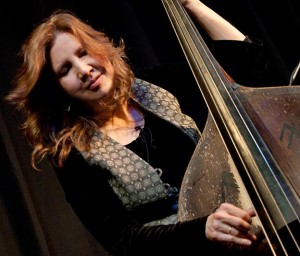 Well, I got really serious and focused about it. I knew when I got out of high school that I only wanted to do music. I talked my folks out of making me go to college. [laughs] I moved to Charlottesville and I played in a band down there, and it was my first taste of playing professionally. I was in a band with very learned musicians so I had to step up my game a lot, and I started doing some study on my own to really try to beef up and fill in the holes and gaps that I didn’t have in my musical background. Also, I just listened and listened and listened to different kinds of music to try to broaden my tastes and broaden my horizons.
Well, I got really serious and focused about it. I knew when I got out of high school that I only wanted to do music. I talked my folks out of making me go to college. [laughs] I moved to Charlottesville and I played in a band down there, and it was my first taste of playing professionally. I was in a band with very learned musicians so I had to step up my game a lot, and I started doing some study on my own to really try to beef up and fill in the holes and gaps that I didn’t have in my musical background. Also, I just listened and listened and listened to different kinds of music to try to broaden my tastes and broaden my horizons.
The whole other music thing has always been a driving force for me because as much as I truly, truly love bluegrass, I have always been interested in exploration and trying to be innovative with different kinds of music. I’ve gravitated to bands that also were into stretching boundaries with their musicianship, and that stretched me as a player. That’s what kind of pointed me in the direction that I’m at today, which is being a bandleader of my own and branching out with the band that have called The New Hip. It’s not bluegrass band, but we do have some real strong roots in bluegrass. If you were to hear any given tune [of ours], you’d probably say, ‘that doesn’t really sound like bluegrass to me.’ It’s all a matter of perspective.
I’m just always trying to stretch as much as I can, but really I’m just trying to honor the songs. Whatever songs I tend to write or do of others, I just try to do what the song deserves. I never try to take a song and make it a bluegrass song, or take a bluegrass song and make it a rock song. I just try to play it and see what makes it really work for me. If that means the instrumentation for that song is electric guitar, acoustic guitar, bass and drums, then that’s what it’s going to be.
Do you feel you have a lot of trouble fighting people who want to label you? For example, you’re either a bluegrass bassist or a jazz bassist.
Is it trouble? I wouldn’t say so. I say that anyone that wants to think about me is fine! [laughs] It definitely has come up… A lot of people know me as a bluegrass bassist because that’s what I am. I see it as a natural progression and state of things when even though I’m playing something today that I wasn’t playing 10 years ago, maybe for some people, they just like to say “You’re in this box and we want to keep you here.”
I can’t really get bogged down with whether that’s good or bad. I just have know that I’m very comfortable with where I am right now and being very comfortable with the music we’re playing. I’ve had really great experiences with some very old fans that have followed my career throughout and are still there with me and loving what we’re doing, so that makes it all worth it.
You’ve been playing for a long time, and you’ve won seven International Bluegrass Music Association Bass Player of the Year Awards. What is it to you that makes a great bassist?
That’s a great question. You know, it would be easy to say, “it just takes a really great player and someone with a lot of skill.” Of course, those things are obviously important. But you know what I think it takes more than anything? I think it takes a team player mindset. You know, somebody who is really comfortable with being a support person. We’re not all wired that way.
There are players who are really wired that their time not playing their thing is just time they’re waiting so they can play their thing. And then there are the people who are playing for the sheer joy of actually playing with people. They’re enjoying what’s happening when it’s not their time as much as any. It sounds like I’m making some sort of moral statement about someone’s character.
It’s not really that deep, I just think that bass players maybe more than a lot of other people are more comfortable and happy just being part of the whole groove and the foundation and everything that happens from the moment the song starts to the moment the song ends. It doesn’t mean we don’t enjoy our time to shine, but we see the whole picture. When I talk to other bass players, they get that same enjoyment out of that. A lot of other musicians see the whole song as a way for them to say what they have to say.
You’re part of the bass faculty at Artistworks. Tell us about how those lessons work.
Well, the student becomes a part of this online community and has 24/7 access to all of the lessons and interviews and videos that are online. They also have direct access to the teacher through video exchange, which is of course ArtistWorks’s trademark design. The student uploads a video of them playing, either from a lesson or something else, then I watch it and do a response video which directly and personally responds to that personal video to give them support and ideas and structure on what they just sent me to the next level.
Do you find a recurring theme in your students on things most people need work on?
There are a few trends I’d say, and it tends to deal with technique early on. I’m an interesting hybrid of teacher for that. As I mentioned I come from a non-classically trained background, yet I know classical technique and I can teach it. I use it in my playing, but I also use what some would call sort of a bluegrass technique. What I try to do is create a really great mastery of both, so that’s how I play what I play. I pick and choose.
A saying I use over and over and over in my teaching is “have as many tools as you can in your toolbox.” I see these things as tool. I promote and teach my students to spend the time to learn an classically correct open hand position. But I also encourage them that when playing certain genres of music that in order to create the best tone. They may actually not use that hand technique, they may use what some would consider to be bad technique, but it creates the best tone. You can watch any number of jazz players or bluegrass players out there who are using this technique and making great music. I try to keep them open for both of them.
I push pretty for my students to learn this open hand technique, but I also say remember how you get this big, fat, warm tone, and that’s with pressing all your fingers flat down – breaking all the rules that we just talked about. I see them as two separate tools.
So there’s lots of technique stuff that I see. There are a lot of folks who are playing in bands or their own communities, maybe playing part time just for fun. You know, the better student gets, the more nit-picky you can get with them.
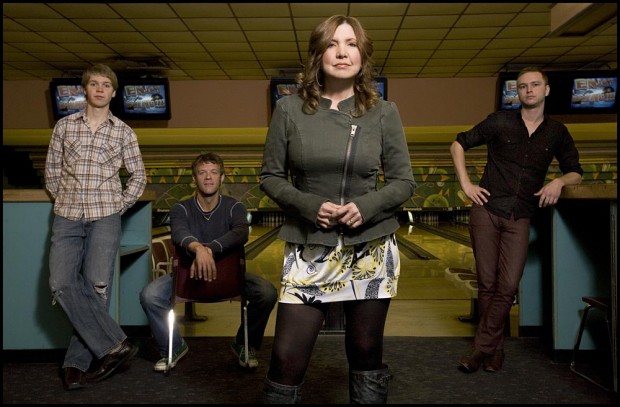
You’re about to hit the road with your band, The New Hip. Are we going to be seeing a new album from you anytime soon?
Yes, as a matter of fact. My band is going into the studio in August, and we hope to be finished by September 1st. The record should be out by the first of 2013. The new record still has the same band, but has slightly personnel from the first record, which is almost four years old. The first record was mostly instrumental with a little bit of singing, but this time it will be opposite with more singing and just a few instrumentals. That’s sort of the place that this band has grown to, which is something I had intended from the get go anyway.

